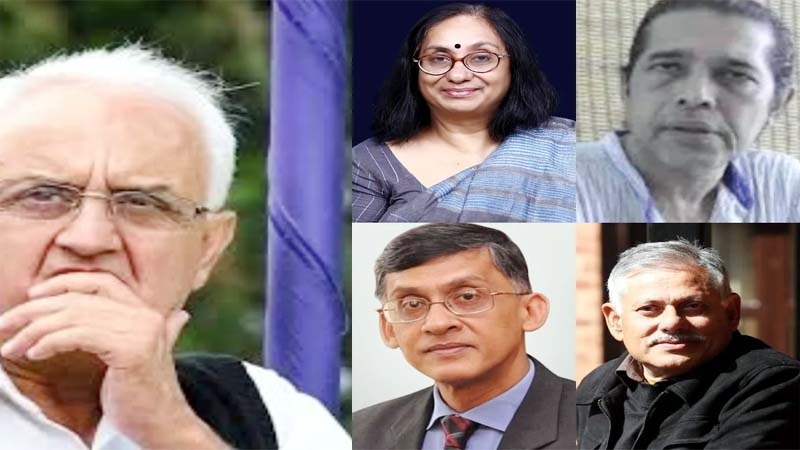- Muslim League leads new electoral alliance, Jatiya Muslim Jote |
- Tk 500cr Drive to Turn Haor Fallow Land Into Farmland |
- Tarique Rahman returns home amid rapturous reception |
- Home After 17 Years: Tarique Returns to Gulshan Residence |
- Tarique Calls for United Effort to Build a Safe Bangladesh |
South Asian Leaders Urge India to Cease Pol Interference

Five prominent leaders from Bangladesh, Nepal, and Sri Lanka issued a joint statement on Saturday, urging India to stop its interference in the internal affairs of their countries, particularly in light of recent developments in Bangladesh.
The statement was signed by Firdous Azim, an English professor and member of the feminist organization Naripokkho in Bangladesh; Kanak Mani Dixit, a writer and founding editor of Himal Southasian in Kathmandu; Lakshman Gunasekara, a journalist and social activist in Colombo; Manzoor Hasan of the Centre for Peace and Justice at BRAC University in Dhaka; and Sushil Pyakurel, a former commissioner of the National Human Rights Commission in Kathmandu.
In their appeal, the leaders emphasized that India’s longstanding interventions—carried out by its political, bureaucratic, and intelligence sectors—have fueled political instability and strengthened autocratic regimes in Bangladesh, Nepal, and Sri Lanka. They argued that such actions undermine democracy, hinder socio-economic progress, and contradict the principles of peaceful coexistence that India once championed.
The signatories specifically criticized India’s approach as inconsistent with its widely-publicized “Neighbourhood First” policy. They highlighted that while India’s involvement in Bangladesh’s liberation in 1971 is appreciated, its subsequent actions have been driven by self-interest. These include attempts to control water resources, secure transit routes through Bangladesh, and create a lucrative market for Indian goods. The statement accused India of supporting Sheikh Hasina’s autocratic rule in exchange for political and economic advantages.
Regarding Sri Lanka, the leaders recalled India’s intervention during the Tamil insurgency in the late 1980s, marked by the deployment of the Indian Peace Keeping Force (IPKF), which they viewed as an effort to safeguard Indian interests. They also noted ongoing interference in Sri Lankan politics and the recent push by Indian business conglomerates into the country.
In Nepal, the statement pointed to India’s history of political manipulation through diplomats and intelligence agencies, as well as the 2015 blockade that was imposed when Nepal adopted a constitution that India disapproved of. The blockade, which came in the wake of a devastating earthquake, was seen as a coercive measure to align Nepal’s policies with India’s interests.
The leaders expressed dismay over the role of certain politicians in their countries who, they claim, have prioritized personal gain over national sovereignty by welcoming Indian interference. They warned that such actions create lasting resentment towards India, which could jeopardize regional stability.
The statement called for a comprehensive review of India’s South Asia policy, urging New Delhi to re-evaluate its approach and adopt a more respectful and supportive stance towards its neighbors. They suggested that India’s regional influence would be more positively received if it viewed neighboring countries through the lens of mutual respect and shared prosperity.
Addressing India’s concerns about China’s growing presence in the region, the signatories asserted that each country should have the right to engage with Beijing independently, without pressure from New Delhi. They emphasized that Bangladesh, Nepal, and Sri Lanka should not fall under the influence of any major power, including India or China.
The leaders also extended their concerns to the Maldives and Bhutan, which they said face similar challenges due to Indian interference. They underscored that the ongoing tension between India and Pakistan further exacerbates regional instability and hampers collective progress in South Asia.
In conclusion, the statement urged India to respect the democratic aspirations of its neighbors and allow each country to determine its own future, free from external interference. They called for a new era of cooperation and mutual respect that would benefit the entire region.

